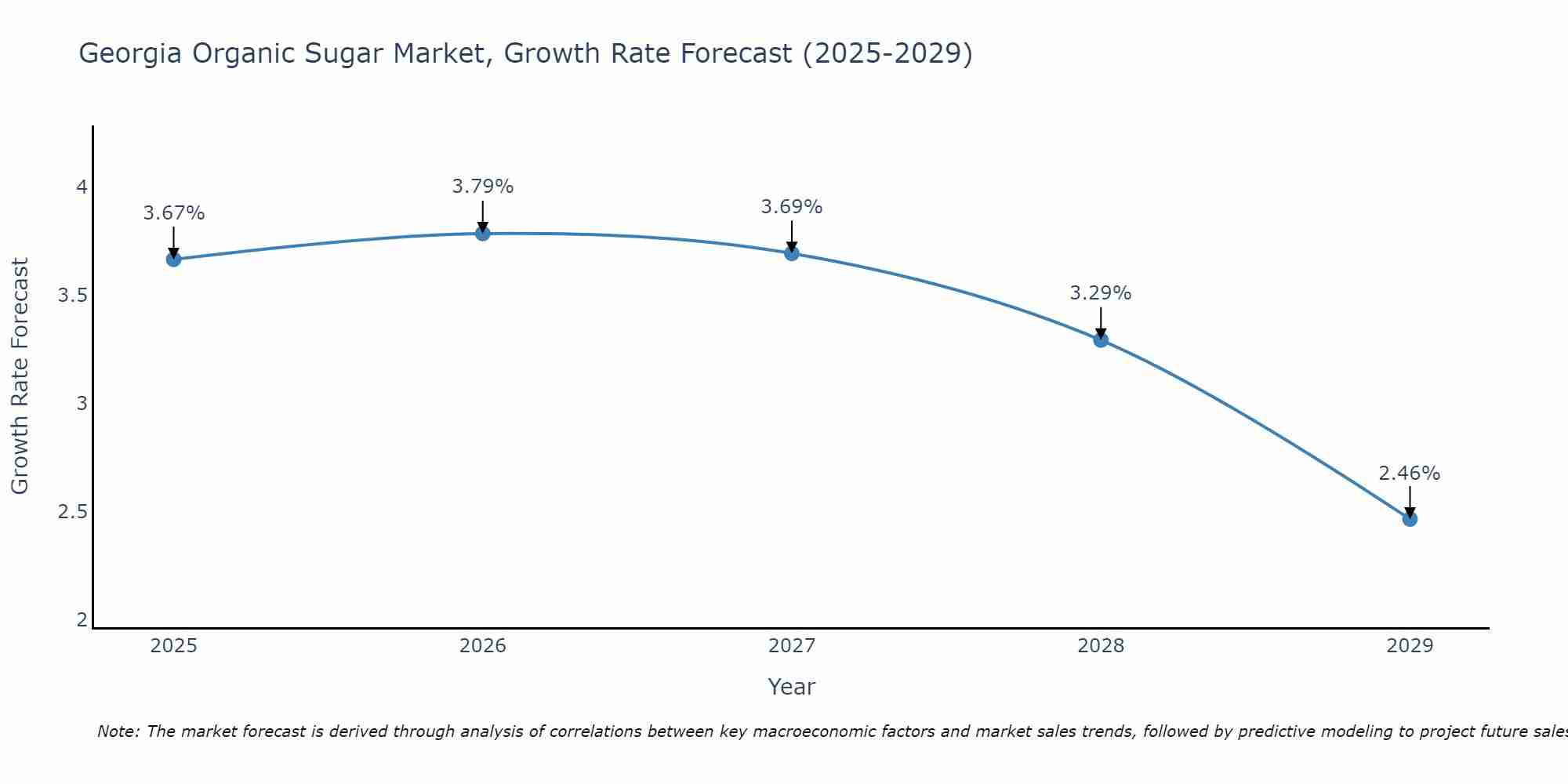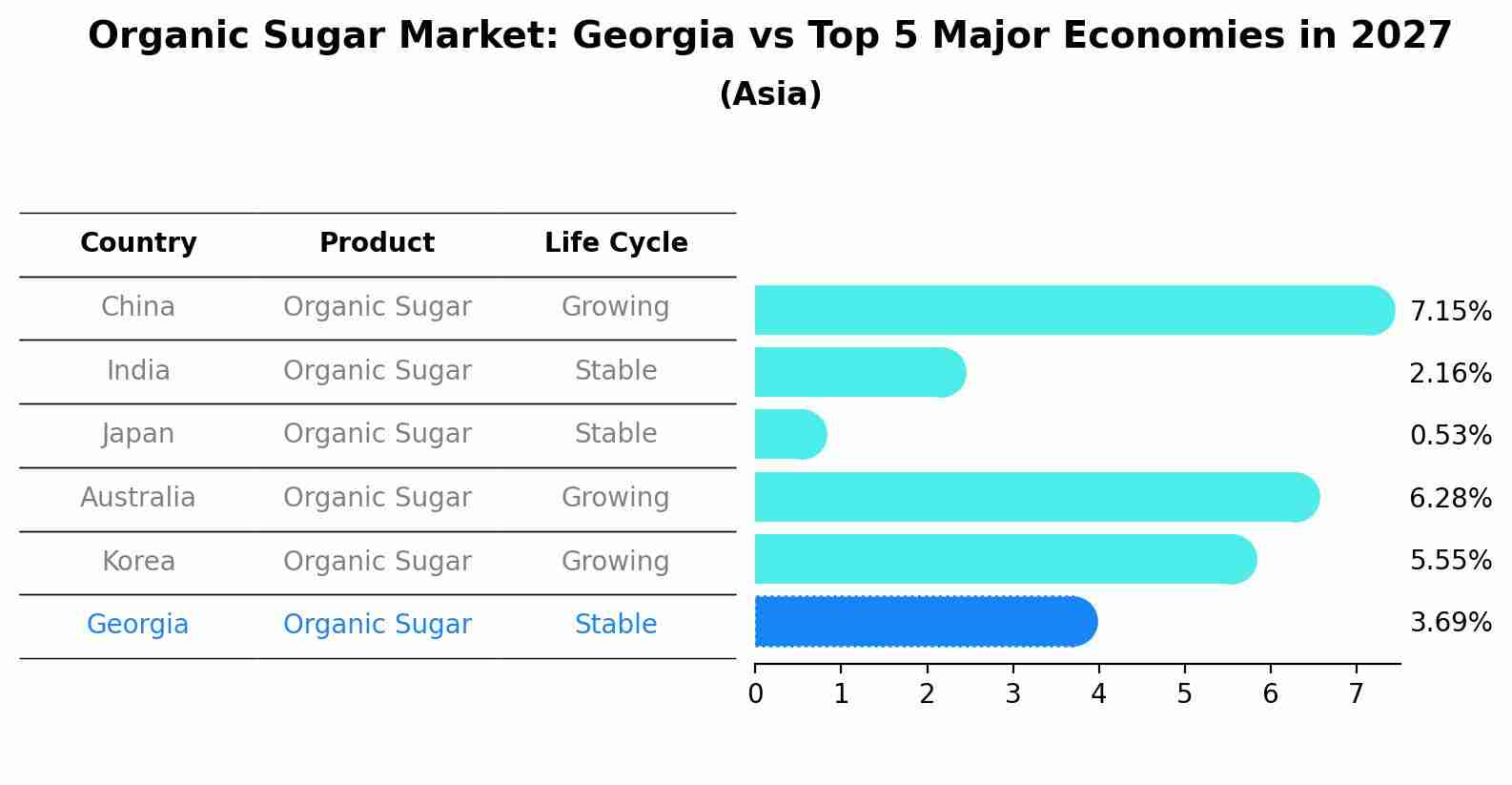Georgia Organic Sugar Market Outlook | Revenue, Industry, Value, Share, Analysis, Companies, Trends, COVID-19 IMPACT, Size, Growth & Forecast
| Product Code: ETC109759 | Publication Date: Jun 2021 | Updated Date: Jun 2025 | Product Type: Report | |
| Publisher: 6Wresearch | Author: Bhawna Singh | No. of Pages: 70 | No. of Figures: 35 | No. of Tables: 5 |
Georgia Organic Sugar Market Size Growth Rate
The Georgia Organic Sugar Market is projected to witness mixed growth rate patterns during 2025 to 2029. The growth rate begins at 3.67% in 2025, climbs to a high of 3.79% in 2026, and moderates to 2.46% by 2029.

Organic Sugar Market: Georgia vs Top 5 Major Economies in 2027 (Asia)
In the Asia region, the Organic Sugar market in Georgia is projected to expand at a stable growth rate of 3.69% by 2027. The largest economy is China, followed by India, Japan, Australia and South Korea.

Georgia Organic Sugar Market Overview
The Georgia organic sugar market is experiencing steady growth due to increasing consumer demand for organic and natural food products. Local organic sugar producers in Georgia are focusing on sustainable farming practices, such as crop rotation and minimal pesticide use, to meet the stringent organic certification standards. The market is also benefiting from the growing popularity of organic baked goods, confectionery products, and beverages among health-conscious consumers. Georgia`s favorable climate and fertile soil make it conducive for cultivating organic sugar crops. However, the market faces challenges such as competition from imported organic sugars and the need for continuous innovation in packaging and marketing strategies to differentiate local organic sugar products. Overall, the Georgia organic sugar market holds promising opportunities for producers willing to invest in organic farming practices and cater to the rising demand for organic sweeteners.
Georgia Organic Sugar Market Trends
Currently, the Georgia Organic Sugar Market is experiencing a growing demand for locally sourced and sustainable products. Consumers are increasingly seeking organic sugar as a healthier alternative to conventional sugar, driven by a desire for transparency in sourcing and production methods. There is a notable increase in awareness about the environmental impact of conventional sugar production, leading more consumers to opt for organic options. Additionally, there is a trend towards supporting local farmers and businesses, further boosting the demand for organic sugar produced within Georgia. As a result, organic sugar producers in Georgia are expanding their operations and investing in sustainable practices to meet the rising market demand for organic sugar products.
Georgia Organic Sugar Market Challenges
In the Georgia organic sugar market, one of the main challenges faced is the limited availability of organic sugar production. The climate and soil conditions in Georgia may not be ideal for cultivating organic sugarcane, leading to lower yields and higher production costs compared to conventional sugar farming. Additionally, organic certification requirements can be stringent and costly for farmers to meet, further restricting the growth of the organic sugar sector in the region. Lack of awareness and consumer demand for organic sugar products also pose challenges for market expansion. Overall, overcoming these challenges will require investments in research and development, farmer education, and marketing efforts to promote organic sugar as a sustainable and healthy alternative in Georgia.
Georgia Organic Sugar Market Investment Opportunities
The Georgia organic sugar market presents an attractive investment opportunity due to the increasing consumer demand for organic and sustainably sourced products. With consumers becoming more health-conscious and environmentally aware, there is a growing preference for organic sugar over conventional options. Investing in organic sugar production in Georgia can capitalize on this trend and cater to the rising demand. Moreover, Georgia`s favorable climate and fertile soil provide ideal conditions for cultivating organic sugar cane, offering a competitive advantage in terms of quality and production efficiency. By leveraging these factors and tapping into the growing organic food market, investors can potentially benefit from the long-term growth prospects and profitability of the Georgia organic sugar industry.
Georgia Organic Sugar Market Government Policy
The government policies related to the Georgia Organic Sugar Market focus on promoting sustainable agricultural practices and ensuring the production of high-quality organic sugar. These policies include providing financial incentives and support to farmers transitioning to organic farming methods, regulating the certification process for organic sugar production, and imposing strict quality control measures to maintain the integrity of organic labeling. Additionally, the government emphasizes the importance of environmental conservation and biodiversity preservation in sugar cultivation, encouraging farmers to adopt eco-friendly practices. Overall, the government`s policies aim to foster a thriving organic sugar market in Georgia while safeguarding consumer interests and promoting sustainable agriculture.
Georgia Organic Sugar Market Future Outlook
The future outlook for the Georgia Organic Sugar Market appears promising as consumer demand for organic products continues to rise. With an increasing focus on health and sustainability, more consumers are seeking organic alternatives to conventional sugar. Georgia`s agricultural industry is well-positioned to capitalize on this trend, with its fertile soil and favorable climate for sugar production. As organic farming practices become more mainstream and accessible to farmers in the region, we can expect to see growth in organic sugar production in Georgia. This presents an opportunity for farmers to tap into a lucrative market and for the state to further establish itself as a key player in the organic sugar sector.
Key Highlights of the Report:
- Georgia Organic Sugar Market Outlook
- Market Size of Georgia Organic Sugar Market, 2021
- Forecast of Georgia Organic Sugar Market, 2027
- Historical Data and Forecast of Georgia Organic Sugar Revenues & Volume for the Period 2018 - 2027
- Georgia Organic Sugar Market Trend Evolution
- Georgia Organic Sugar Market Drivers and Challenges
- Georgia Organic Sugar Price Trends
- Georgia Organic Sugar Porter's Five Forces
- Georgia Organic Sugar Industry Life Cycle
- Historical Data and Forecast of Georgia Organic Sugar Market Revenues & Volume By Source for the Period 2018 - 2027
- Historical Data and Forecast of Georgia Organic Sugar Market Revenues & Volume By Sugar Beet for the Period 2018 - 2027
- Historical Data and Forecast of Georgia Organic Sugar Market Revenues & Volume By Sugar Cane for the Period 2018 - 2027
- Historical Data and Forecast of Georgia Organic Sugar Market Revenues & Volume By Others for the Period 2018 - 2027
- Historical Data and Forecast of Georgia Organic Sugar Market Revenues & Volume By Application for the Period 2018 - 2027
- Historical Data and Forecast of Georgia Organic Sugar Market Revenues & Volume By Food and Beverage for the Period 2018 - 2027
- Historical Data and Forecast of Georgia Organic Sugar Market Revenues & Volume By Pharmaceutical for the Period 2018 - 2027
- Historical Data and Forecast of Georgia Organic Sugar Market Revenues & Volume By Others for the Period 2018 - 2027
- Historical Data and Forecast of Georgia Organic Sugar Market Revenues & Volume By Type for the Period 2018 - 2027
- Historical Data and Forecast of Georgia Organic Sugar Market Revenues & Volume By Crystal Sugar for the Period 2018 - 2027
- Historical Data and Forecast of Georgia Organic Sugar Market Revenues & Volume By Gelling Sugar for the Period 2018 - 2027
- Historical Data and Forecast of Georgia Organic Sugar Market Revenues & Volume By Liquid Sugar for the Period 2018 - 2027
- Historical Data and Forecast of Georgia Organic Sugar Market Revenues & Volume By Icing Sugar for the Period 2018 - 2027
- Georgia Organic Sugar Import Export Trade Statistics
- Market Opportunity Assessment By Source
- Market Opportunity Assessment By Application
- Market Opportunity Assessment By Type
- Georgia Organic Sugar Top Companies Market Share
- Georgia Organic Sugar Competitive Benchmarking By Technical and Operational Parameters
- Georgia Organic Sugar Company Profiles
- Georgia Organic Sugar Key Strategic Recommendations
Frequently Asked Questions About the Market Study (FAQs):
- Single User License$ 1,995
- Department License$ 2,400
- Site License$ 3,120
- Global License$ 3,795
Search
Thought Leadership and Analyst Meet
Our Clients
Related Reports
- Afghanistan Apparel Market (2026-2032) | Growth, Outlook, Industry, Segmentation, Forecast, Size, Companies, Trends, Value, Share, Analysis & Revenue
- Canada Oil and Gas Market (2026-2032) | Share, Segmentation, Value, Industry, Trends, Forecast, Analysis, Size & Revenue, Growth, Competitive Landscape, Outlook, Companies
- Germany Breakfast Food Market (2026-2032) | Industry, Share, Growth, Size, Companies, Value, Analysis, Revenue, Trends, Forecast & Outlook
- Australia Briquette Market (2025-2031) | Growth, Size, Revenue, Forecast, Analysis, Trends, Value, Share, Industry & Companies
- Vietnam System Integrator Market (2025-2031) | Size, Companies, Analysis, Industry, Value, Forecast, Growth, Trends, Revenue & Share
- ASEAN and Thailand Brain Health Supplements Market (2025-2031) | Strategy, Consumer Insights, Analysis, Investment Trends, Opportunities, Growth, Size, Share, Industry, Revenue, Segments, Value, Segmentation, Supply, Forecast, Restraints, Outlook, Competition, Drivers, Trends, Demand, Pricing Analysis, Competitive, Strategic Insights, Companies, Challenges
- ASEAN Bearings Market (2025-2031) | Strategy, Consumer Insights, Analysis, Investment Trends, Opportunities, Growth, Size, Share, Industry, Revenue, Segments, Value, Segmentation, Supply, Forecast, Restraints, Outlook, Competition, Drivers, Trends, Demand, Pricing Analysis, Competitive, Strategic Insights, Companies, Challenges
- Europe Flooring Market (2025-2031) | Outlook, Share, Industry, Trends, Forecast, Companies, Revenue, Size, Analysis, Growth & Value
- Saudi Arabia Manlift Market (2025-2031) | Outlook, Size, Growth, Trends, Companies, Industry, Revenue, Value, Share, Forecast & Analysis
- Uganda Excavator, Crane, and Wheel Loaders Market (2025-2031) | Strategy, Consumer Insights, Analysis, Investment Trends, Opportunities, Growth, Size, Share, Industry, Revenue, Segments, Value, Segmentation, Supply, Forecast, Restraints, Outlook, Competition, Drivers, Trends, Demand, Pricing Analysis, Competitive, Strategic Insights, Companies, Challenges
Industry Events and Analyst Meet
Whitepaper
- Middle East & Africa Commercial Security Market Click here to view more.
- Middle East & Africa Fire Safety Systems & Equipment Market Click here to view more.
- GCC Drone Market Click here to view more.
- Middle East Lighting Fixture Market Click here to view more.
- GCC Physical & Perimeter Security Market Click here to view more.
6WResearch In News
- Doha a strategic location for EV manufacturing hub: IPA Qatar
- Demand for luxury TVs surging in the GCC, says Samsung
- Empowering Growth: The Thriving Journey of Bangladesh’s Cable Industry
- Demand for luxury TVs surging in the GCC, says Samsung
- Video call with a traditional healer? Once unthinkable, it’s now common in South Africa
- Intelligent Buildings To Smooth GCC’s Path To Net Zero


















